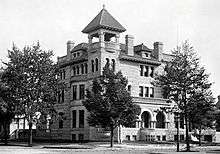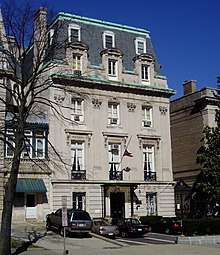Embassy of China in Washington, D.C.
The Embassy of the People's Republic of China in Washington, D.C. is the diplomatic mission of the People's Republic of China to the United States. It is located at 3505 International Place, Northwest, Washington, D.C., in the Van Ness neighborhood.
| Embassy of China, Washington, D.C. Embassy of The People's Republic of China in The United States of America 中华人民共和国驻美利坚合众国大使馆 | |
|---|---|

| |
| Location | Washington, D.C. |
| Address | 3505 International Place, N.W. |
| Coordinates | 38°56′33″N 77°3′59″W |
| Ambassador | Cui Tiankai |
| Website | www |
The embassy also operates Consulates-General in Chicago, Los Angeles, San Francisco, and New York City.[1][2]
The Ambassador is Cui Tiankai, who was appointed in April 2013. The previous ambassador was Zhang Yesui.[3]
History
The Qing Empire opened its first mission to the U.S. in 1875, with Chen Lanbin as Minister. From 1886 to 1893, the legation was located in Stewart's Castle on Dupont Circle,[4] then under Minister Wu Tingfang in the former mansion of Thomas Franklin Schneider at 18th & Q Street, NW.
In 1902, the Qing legation moved to a purpose-built mansion designed by Waddy Butler Wood on 2001 19th Street NW. It is the oldest extant building erected in Washington by a foreign government, following the demolition in 1931 of the former British Legation on Connecticut Avenue, built in 1872.[5] This became the legation of the Republic of China following the fall of the Qing Dynasty in 1912. In 1935, the legation was upgraded to an embassy, and Alfred Sao-ke Sze became China's first ambassador to the U.S. The embassy remained in the same building until 1944, then moved to the former Fahnestock Mansion designed by Nathan C. Wyeth on 2311 Massachusetts Avenue NW (now the embassy of Haiti), where it stayed until the late 1970s.
When the US established diplomatic relations with the People's Republic of China, a liaison office was first established in 1973, led by Huang Zhen. It occupied two adjacent former apartment buildings at 2300 and 2310 Connecticut Avenue NW, and in 1979 became a fully-fledged embassy. These buildings were torn down in 2012 (except a 1922 façade on Connecticut Avenue) and are being replaced by an apartment house for Chinese embassy employees.[6]
The current building in the International Chancery Center was built in 2006-08 on a design by Pei Partnership Architects, with I. M. Pei as consultant.[7]
On February 5, 2014, the Uyghur American Association organized a demonstration in front of the Embassy of China in Washington, D.C. to commemorate the 17th anniversary of the Ghulja Massacre.[8]
Street renaming proposals
In June 2014 during the 113th United States Congress, Republican Senator Ted Cruz introduced a simple resolution[9] while Republican Representative Frank Wolf also proposed[10] to rename the street in front of the Chinese Embassy after the Chinese dissident Liu Xiaobo. This would make the embassy's new address "1 Liu Xiaobo Plaza".[11] But both of them got stuck in the introduction stage.[12][13] BBC reported that Hua Chunying, a spokeswoman for the Ministry of Foreign Affairs of the People's Republic of China, dismissed the lawmakers' move as "nothing more than a sheer farce", and restated the government's position that Mr. Liu had been convicted for breaking domestic laws.[14] New York Times also reported that when Hua was asked if China would retaliate by renaming the street in front of the Embassy of the United States, Beijing, she smiled and asked rhetorically, "Do you think China should take identical action as America?" Many Chinese commented online, suggesting China do just that. Proposal included “Prisoners Abused Street,” “Edward Snowden Street,” “Osama bin Laden Road” and even "Monica Lewinsky Street."[15]
During the 114th United States Congress in 2016, both Sen. Cruz and Rep. Mark Meadows introduced bills to continue the efforts.[16][17] On February 12, the senate passed Cruz's version unanimously. On February 16, the administration announced that US President Barack Obama would veto[18] legislation for the renaming act.[19] Hong Lei, a spokesman for the Chinese Foreign Ministry, said at a press conference that China hoped that the Obama administration could "put an end to this political farce."[20][21] On February 23, Cruz's bill was referred to U.S. House Committee on Oversight and Government Reform but never cleared the House to present to President Obama for him to veto it.[22]
During the 115th United States Congress, on May 18, 2017, Sen. Cruz and Rep. Meadows re-introduced bills to resume their push to rename the address.[23][24] After Dr. Liu's death on July 13, Bob Fu, a Chinese American human rights activist and pastor, told The Texas Tribune that he is “definitely more optimistic” about Cruz's bill getting enacted with President Donald Trump in office.[25]
In 2020, a group of Republican senators and representatives proposed renaming the street after whistleblower Li Wenliang, who was warned by authorities after drawing attention to the initial outbreak of COVID-19 in Wuhan.[26][27]
Gallery
 Stewart's Castle on Dupont Circle, Qing legation 1886-93 (demolished in 1901)
Stewart's Castle on Dupont Circle, Qing legation 1886-93 (demolished in 1901) Schneider Mansion on 18th and Q Street NW, Qing legation around 1900 (demolished in 1958)
Schneider Mansion on 18th and Q Street NW, Qing legation around 1900 (demolished in 1958)- Qing, then ROC legation/embassy on 2001 19th Street NW (now the Chinese Embassy condominiums)
 Gibson Fahnestock House, ROC embassy 1944-1978 (now Embassy of Haiti)
Gibson Fahnestock House, ROC embassy 1944-1978 (now Embassy of Haiti).jpg) Former PRC embassy on 2300 Connecticut Avenue NW (demolished in 2012)
Former PRC embassy on 2300 Connecticut Avenue NW (demolished in 2012)
See also
- List of diplomatic missions of China
- United States Embassy in Beijing
References
- "China visa and U.S. Passport expedited service provided by VisaRite".
- "Fox News: China threatens retaliation after is says US ordered it to close Houston Consulate".
- "Chinese Ambassadors to the United States of America". Embassy of the People's Republic of China in the United States of America. Retrieved June 26, 2014.
- "Lost History: Stewart's Castle on Dupont Circle". Ghosts of DC. March 28, 2013.
- James M. Goode (2003). Capital Losses: A Cultural History of Washington's Destroyed Buildings. Smithsonian. p. 264.
- John Kelly (November 2, 2013). "Confused by the facade that overlooks Connecticut Avenue? Here's the story". Washington Post.
- Suevon Lee (May 28, 2008). "China's new embassy in U.S. reflects growing clout". New York Times.
- "Uyghur American Association - Ghulja Massacre Protest". February 13, 2014. Retrieved May 7, 2020 – via YouTube.
- "Bills and Resolutions". U.S. Senate. Retrieved July 16, 2017.
- "Appropriations Committee Approves Fiscal Year 2015 State and Foreign Operations Bill". U.S. House of Representatives Committee on Appropriations. Retrieved July 17, 2017.
- Beech, Hannah (June 25, 2014). "Congress Votes to Rename Road by Chinese Embassy After Jailed Dissident". TIME Magazine. Retrieved June 26, 2014.
- Cruz, Ted (June 24, 2014). "S.Res.482 - A resolution expressing the sense of the Senate that the area between the intersections of International Drive, Northwest Van Ness Street, Northwest International Drive, Northwest and International Place, Northwest in Washington, District of Columbia, should be designated as "Liu Xiaobo Plaza"". Congress.gov. Retrieved July 16, 2017.
- Granger, Kay (June 27, 2014). "H.R.5013 - Department of State, Foreign Operations, and Related Programs Appropriations Act, 2015". Congress.gov. Retrieved July 16, 2017.
- "US push to rename Chinese embassy street after dissident". BBC News. June 25, 2014. Retrieved July 17, 2017.
- Tatlow, Didi Kirsten (June 25, 2014). "Dispatches From China Search Sinosphere SEARCH To: Chinese Embassy, United States; Address: No. 1 Liu Xiaobo Plaza". New York Times. Retrieved July 17, 2017.
- Cruz, Ted (February 23, 2016). "S.2451 - A bill to designate the area between the intersections of International Drive, Northwest and Van Ness Street, Northwest and International Drive, Northwest and International Place, Northwest in Washington, District of Columbia, as "Liu Xiaobo Plaza", and for other purposes". Congress.gov. Retrieved July 16, 2017.
- Meadows, Mark. "H.R.4452 - To designate the area between the intersections of International Drive Northwest and Van Ness Street Northwest and International Drive Northwest and International Place Northwest in Washington, District of Columbia, as "Liu Xiaobo Plaza", and for other purposes". Congress.gov. Retrieved July 16, 2017.
- "Vetoes by President Barack H. Obama". U.S. Senate. Retrieved July 16, 2017.
- "Obama to veto bill to rename Washington plaza after jailed China dissident". The Washington Post. February 16, 2016. Retrieved February 16, 2016.
- "Foreign Ministry Spokesperson Hong Lei's Regular Press Conference". Ministry of Foreign Affairs of PRC. February 16, 2016. Retrieved July 17, 2017.
- Beech, Hannah (February 16, 2016). "China Hates That the Road By Its U.S. Embassy Could Be Named After a Top Dissident". Time.com. Retrieved July 17, 2017.
- Cruz, Ted (February 23, 2016). "S.2451 - A bill to designate the area between the intersections of International Drive, Northwest and Van Ness Street, Northwest and International Drive, Northwest and International Place, Northwest in Washington, District of Columbia, as "Liu Xiaobo Plaza", and for other purposes". Congress.gov. Retrieved July 16, 2017.
- Cruz, Ted (May 18, 2017). "S.1187 - A bill to designate the area between the intersections of International Drive, Northwest and Van Ness Street, Northwest and International Drive, Northwest and International Place, Northwest in Washington, District of Columbia, as "Liu Xiaobo Plaza", and for other purposes". Congress.gov. Retrieved July 16, 2017.
- Meadows, Mark (May 18, 2017). "H.R.2537 - To designate the area between the intersections of International Drive Northwest and Van Ness Street Northwest and International Drive Northwest and International Place Northwest in Washington, District of Columbia, as "Liu Xiaobo Plaza", and for other purposes". Congress.gov. Retrieved July 16, 2017.
- Thomas, Neil (July 15, 2017). "After dissident's death, Ted Cruz hopeful about changing Chinese Embassy address". Texas Tribune. Retrieved July 16, 2017.
- "US senators propose renaming street outside Chinese embassy after Wuhan whistleblower". The Guardian. May 8, 2020. Retrieved August 4, 2020.
- Coleman, Justine (May 7, 2020). "GOP lawmakers propose renaming street in front of Chinese embassy after Wuhan whistleblower doctor". TheHill. Retrieved August 4, 2020.
External links
| Wikimedia Commons has media related to Embassy of China, Washington, D.C.. |